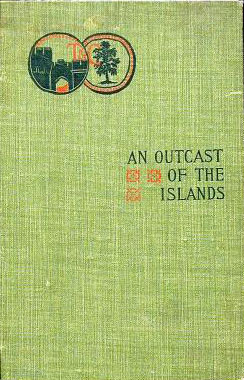Joseph Conrad - The Mirror of the Sea
Here you can read online Joseph Conrad - The Mirror of the Sea full text of the book (entire story) in english for free. Download pdf and epub, get meaning, cover and reviews about this ebook. genre: Adventure. Description of the work, (preface) as well as reviews are available. Best literature library LitArk.com created for fans of good reading and offers a wide selection of genres:
Romance novel
Science fiction
Adventure
Detective
Science
History
Home and family
Prose
Art
Politics
Computer
Non-fiction
Religion
Business
Children
Humor
Choose a favorite category and find really read worthwhile books. Enjoy immersion in the world of imagination, feel the emotions of the characters or learn something new for yourself, make an fascinating discovery.
- Book:The Mirror of the Sea
- Author:
- Genre:
- Rating:3 / 5
- Favourites:Add to favourites
- Your mark:
- 60
- 1
- 2
- 3
- 4
- 5
The Mirror of the Sea: summary, description and annotation
We offer to read an annotation, description, summary or preface (depends on what the author of the book "The Mirror of the Sea" wrote himself). If you haven't found the necessary information about the book — write in the comments, we will try to find it.
The Mirror of the Sea — read online for free the complete book (whole text) full work
Below is the text of the book, divided by pages. System saving the place of the last page read, allows you to conveniently read the book "The Mirror of the Sea" online for free, without having to search again every time where you left off. Put a bookmark, and you can go to the page where you finished reading at any time.
Font size:
Interval:
Bookmark:
The Project Gutenberg EBook of The Mirror of the Sea, by Joseph Conrad (#16 in our series by Joseph Conrad)
Copyright laws are changing all over the world. Be sure to check the copyright laws for your country before downloading or redistributing this or any other Project Gutenberg eBook.
This header should be the first thing seen when viewing this Project Gutenberg file. Please do not remove it. Do not change or edit the header without written permission.
Please read the "legal small print," and other information about the eBook and Project Gutenberg at the bottom of this file. Included is important information about your specific rights and restrictions in how the file may be used. You can also find out about how to make a donation to Project Gutenberg, and how to get involved.
**Welcome To The World of Free Plain Vanilla Electronic Texts**
**eBooks Readable By Both Humans and By Computers, Since 1971**
*****These eBooks Were Prepared By Thousands of Volunteers!*****
Title: The Mirror of the Sea
Author: Joseph Conrad
Release Date: October, 1997 [EBook #1058] [This file was first posted on October 10, 1997] [Most recently updated: June 26, 2003]
Edition: 10
Language: English
Character set encoding: US-ASCII
*** START OF THE PROJECT GUTENBERG EBOOK, THE MIRROR OF THE SEA ***
Transcribed by David Price, email ccx074@coventry.ac.uk
The Mirror of the Sea
Contents:
I. Landfalls and Departures IV. Emblems of Hope VII. The Fine Art X. Cobwebs and Gossamer XIII. The Weight of the Burden XVI. Overdue and Missing XX. The Grip of the Land XXII. The Character of the Foe XXV. Rules of East and West XXX. The Faithful River XXXIII. In Captivity XXXV. Initiation XXXVII. The Nursery of the Craft XL. The Tremolino XLVI. The Heroic Age
"And shippes by the brinke comen and gon, And in swich forme endure a day or two." The Frankeleyn's Tale.
Landfall and Departure mark the rhythmical swing of a seaman's life and of a ship's career. From land to land is the most concise definition of a ship's earthly fate.
A "Departure" is not what a vain people of landsmen may think. The term "Landfall" is more easily understood; you fall in with the land, and it is a matter of a quick eye and of a clear atmosphere. The Departure is not the ship's going away from her port any more than the Landfall can be looked upon as the synonym of arrival. But there is this difference in the Departure: that the term does not imply so much a sea event as a definite act entailing a process--the precise observation of certain landmarks by means of the compass card.
Your Landfall, be it a peculiarly-shaped mountain, a rocky headland, or a stretch of sand-dunes, you meet at first with a single glance. Further recognition will follow in due course; but essentially a Landfall, good or bad, is made and done with at the first cry of "Land ho!" The Departure is distinctly a ceremony of navigation. A ship may have left her port some time before; she may have been at sea, in the fullest sense of the phrase, for days; but, for all that, as long as the coast she was about to leave remained in sight, a southern-going ship of yesterday had not in the sailor's sense begun the enterprise of a passage.
The taking of Departure, if not the last sight of the land, is, perhaps, the last professional recognition of the land on the part of a sailor. It is the technical, as distinguished from the sentimental, "good-bye." Henceforth he has done with the coast astern of his ship. It is a matter personal to the man. It is not the ship that takes her departure; the seaman takes his Departure by means of cross-bearings which fix the place of the first tiny pencil-cross on the white expanse of the track-chart, where the ship's position at noon shall be marked by just such another tiny pencil cross for every day of her passage. And there may be sixty, eighty, any number of these crosses on the ship's track from land to land. The greatest number in my experience was a hundred and thirty of such crosses from the pilot station at the Sand Heads in the Bay of Bengal to the Scilly's light. A bad passage...
A Departure, the last professional sight of land, is always good, or at least good enough. For, even if the weather be thick, it does not matter much to a ship having all the open sea before her bows. A Landfall may be good or bad. You encompass the earth with one particular spot of it in your eye. In all the devious tracings the course of a sailing-ship leaves upon the white paper of a chart she is always aiming for that one little spot--maybe a small island in the ocean, a single headland upon the long coast of a continent, a lighthouse on a bluff, or simply the peaked form of a mountain like an ant-heap afloat upon the waters. But if you have sighted it on the expected bearing, then that Landfall is good. Fogs, snowstorms, gales thick with clouds and rain--those are the enemies of good Landfalls.
II.
Some commanders of ships take their Departure from the home coast sadly, in a spirit of grief and discontent. They have a wife, children perhaps, some affection at any rate, or perhaps only some pet vice, that must be left behind for a year or more. I remember only one man who walked his deck with a springy step, and gave the first course of the passage in an elated voice. But he, as I learned afterwards, was leaving nothing behind him, except a welter of debts and threats of legal proceedings.
On the other hand, I have known many captains who, directly their ship had left the narrow waters of the Channel, would disappear from the sight of their ship's company altogether for some three days or more. They would take a long dive, as it were, into their state-room, only to emerge a few days afterwards with a more or less serene brow. Those were the men easy to get on with. Besides, such a complete retirement seemed to imply a satisfactory amount of trust in their officers, and to be trusted displeases no seaman worthy of the name.
On my first voyage as chief mate with good Captain MacW- I remember that I felt quite flattered, and went blithely about my duties, myself a commander for all practical purposes. Still, whatever the greatness of my illusion, the fact remained that the real commander was there, backing up my self-confidence, though invisible to my eyes behind a maple-wood veneered cabin-door with a white china handle.
That is the time, after your Departure is taken, when the spirit of your commander communes with you in a muffled voice, as if from the sanctum sanctorum of a temple; because, call her a temple or a "hell afloat"--as some ships have been called--the captain's state- room is surely the august place in every vessel.
The good MacW- would not even come out to his meals, and fed solitarily in his holy of holies from a tray covered with a white napkin. Our steward used to bend an ironic glance at the perfectly empty plates he was bringing out from there. This grief for his home, which overcomes so many married seamen, did not deprive Captain MacW- of his legitimate appetite. In fact, the steward would almost invariably come up to me, sitting in the captain's chair at the head of the table, to say in a grave murmur, "The captain asks for one more slice of meat and two potatoes." We, his officers, could hear him moving about in his berth, or lightly snoring, or fetching deep sighs, or splashing and blowing in his bath-room; and we made our reports to him through the keyhole, as it were. It was the crowning achievement of his amiable character that the answers we got were given in a quite mild and friendly tone. Some commanders in their periods of seclusion are constantly grumpy, and seem to resent the mere sound of your voice as an injury and an insult.
But a grumpy recluse cannot worry his subordinates: whereas the man in whom the sense of duty is strong (or, perhaps, only the sense of self-importance), and who persists in airing on deck his moroseness all day--and perhaps half the night--becomes a grievous infliction. He walks the poop darting gloomy glances, as though he wished to poison the sea, and snaps your head off savagely whenever you happen to blunder within earshot. And these vagaries are the harder to bear patiently, as becomes a man and an officer, because no sailor is really good-tempered during the first few days of a voyage. There are regrets, memories, the instinctive longing for the departed idleness, the instinctive hate of all work. Besides, things have a knack of going wrong at the start, especially in the matter of irritating trifles. And there is the abiding thought of a whole year of more or less hard life before one, because there was hardly a southern-going voyage in the yesterday of the sea which meant anything less than a twelvemonth. Yes; it needed a few days after the taking of your departure for a ship's company to shake down into their places, and for the soothing deep-water ship routine to establish its beneficent sway.
Font size:
Interval:
Bookmark:
Similar books «The Mirror of the Sea»
Look at similar books to The Mirror of the Sea. We have selected literature similar in name and meaning in the hope of providing readers with more options to find new, interesting, not yet read works.
Discussion, reviews of the book The Mirror of the Sea and just readers' own opinions. Leave your comments, write what you think about the work, its meaning or the main characters. Specify what exactly you liked and what you didn't like, and why you think so.












